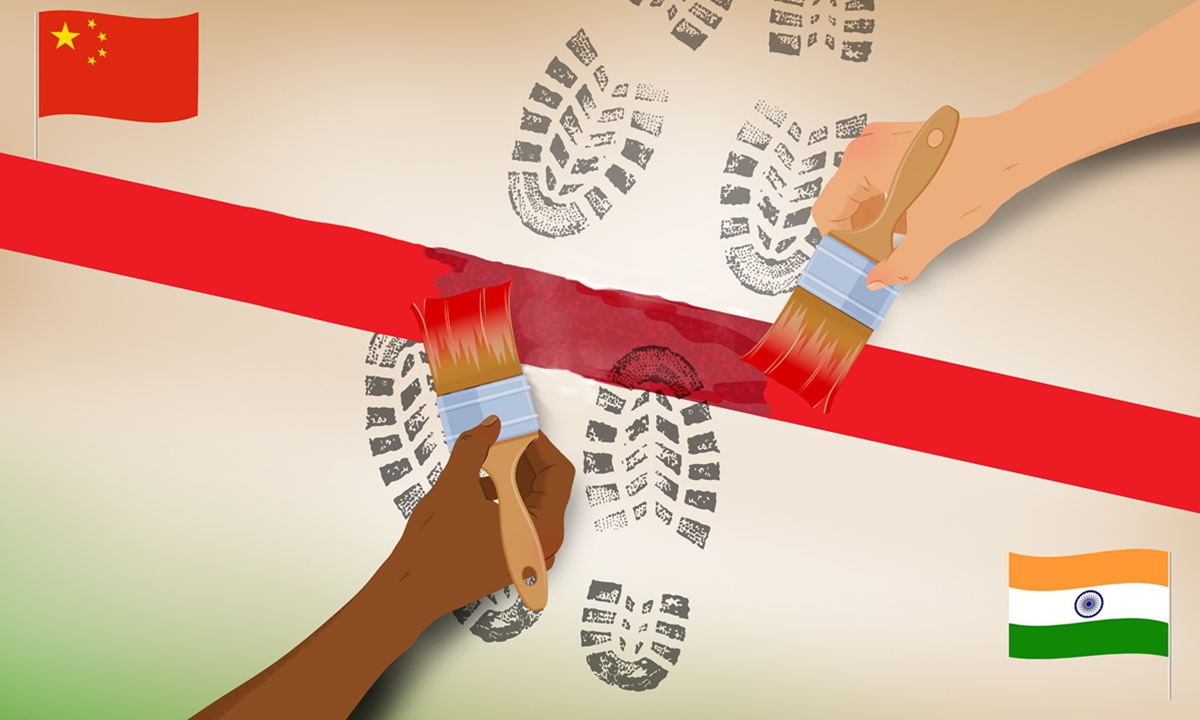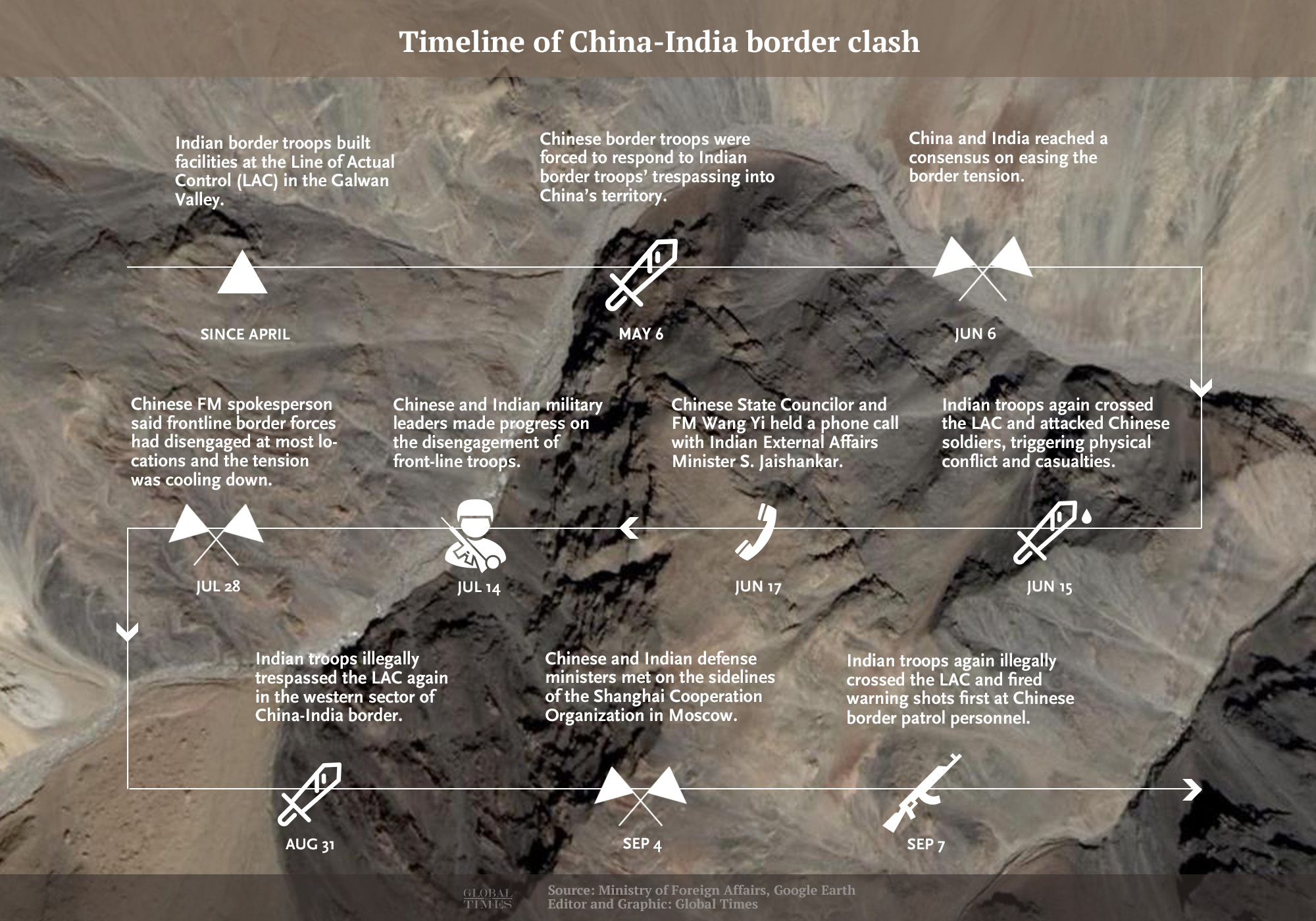Indian troops' tactics won't help with negotiations with China: experts
By Yang Sheng and Liu Xuanzun Source: Global Times Published: 2020/9/9 22:10:52
Indian troops' tactics won’t help with negotiations with China: experts

China India Photo: GT
Before the Shanghai Cooperation Organization (SCO) foreign ministers' meeting on Thursday to be attended by China and India, Indian troops in the border region continued with provocative actions against China, such as firing in the air, to increase leverage in its negotiations with China. But experts warned on Wednesday that this could make it difficult for the two sides to reach an agreement to de-escalate tensions, and would even spark a conflict before winter.
Chinese analysts said that Indian diplomats and the military are playing an old game - being tough and aggressive at the front line but pragmatic and reasonable at the negotiating table. To handle this, China is also fully prepared for any possibility - reach an agreement with India to realize full disengagement, or prepare for battle if the negotiations collapse and India escalates the crisis.
The Chinese military and foreign ministry on Tuesday slammed Indian troops for firing first in the Monday border clash and illegally crossing the Line of Actual Control (LAC) again, which it said had destroyed tranquility on the China-India border since 1975, demanding India punish the personnel who fired the provocative shot and avoid similar incidents.
The Indian army's firing of shots, the first time in more than four decades in a border region between China and India, is an extremely dangerous act, and broke the tacit understanding reached by both sides not to use firearms, Chinese experts said, noting that the risk of accidentally sparking another conflict is increasing.
Lin Minwang, deputy director at the Center for South Asian Studies at Fudan University, told the Global Times on Thursday that the risky moves on the frontline made by Indian troops will impact the negotiations between the two foreign ministers in Moscow. China will show the same attitude - simultaneously preparing for talks and a fight - rather than totally refusing negotiations.
The Chinese Foreign Ministry said on Wednesday that Chinese State Councilor and Foreign Minister Wang Yi will attend the SCO foreign ministers' meeting, will meet his counterparts, and attend a trilateral luncheon of Chinese, Russian and Indian foreign ministers.
To what extent the meetings in Moscow could help the de-escalation of the border crisis depends on the determination and strength of both sides, as well as the weather in the border region, because the winter season will be a huge challenge to troops on both sides in Ladakh, Lin said.
China will not compromise on sovereignty, as it is being provoked. "But India will also find it hard to step back because of pressure from nationalists. So a conflict is truly likely," Lin noted.
Military preparation
Following renewed border tensions between China and India in the past two weeks, the Chinese People's Liberation Army (PLA) has been reportedly mobilizing forces, including bombers, air defense troops, artillery, armored vehicles, paratroopers, special forces and infantry units, from different parts of the country to the plateau region, a move that shows the PLA's capability and determination to safeguard the country's sovereignty and territorial integrity, analysts said on Wednesday.
H-6 bombers and Y-20 large transport aircraft attached to the PLA Central Theater Command Air Force have been deployed to the plateau region to train, the command said on Tuesday, a day after Indian troops again illegally crossed the LAC at the Shenpao mountain region near the southern bank of Pangong Tso Lake, and for the first time in 45 years fired shots.
China has been practicing restraint and showing goodwill, which was misinterpreted by India as a concession. The latest troop deployments should hopefully act as a deterrent and sober the minds of the Indians, and also prepare for the worst-case scenario if a larger conflict breaks out, the expert said.
Contrary to what Indian media would like Indians to believe, the PLA holds the overwhelming advantage in almost all aspects, including personnel, equipment, tactics and strategies, military analysts said.

Infographic: GT
Nationalist 'opium'
Indian media and some Indian netizens, also known as "keyboard warriors," have always tried to keep the fire of nationalism burning and hype anti-China sentiment by spreading misinformation and fake news, with Chinese analysts saying that nationalism in India is just like "opium" to New Delhi's decision-makers, since they are unable and unwilling to control it.
"Nationalism and the anti-China sentiment are useful for Indian leaders to cover their failed governance of the economy and handling of the coronavirus. So New Delhi tried to hype it. It now realizes it's impossible to control the sentiment. This makes it difficult for Indian diplomats to compromise. And if Indian troops withdraw, the government needs to find a good excuse for fanatical and radical nationalists," said a Chinese scholar on Indian studies familiar with the situation, who requested anonymity.
A rumor that the PLA has occupied an Indian airport in Chushul, near the border region, appeared recently on Indian social media platform defenceforumindia.com.
On Friday, Indian media also reported that the Taiwan military has "shot down a PLA Air Force fighter jet," but that the Taiwan "defense authority" hurriedly issued a statement refuting the misinformation.
The misinformation of was first published by Indian media outlet called "News Line IFE" on Twitter. Then other Indian media, including ABP News and Times Now, quickly joined in to spread fake news. News Line IFE deleted the tweet after it was pointed out to be fake, but it has not clarified further as of press time.
Indian media made groundless speculations and published fake news based on a video circulating on social media, which has caused a negative impact, and even risked triggering misjudgments on the situation across the Taiwan Straits. The incident reflected the rumor-mongering tendency of some Indian media outlets, and their wish to distract China's attention from the border crisis with India, Chinese experts said.
"On one hand, Indian nationalists are extremely arrogant and naively believe that they can beat China and be Asia's top superpower; but they are truly cowardly and insecure. That's why they are playing these low tricks to try to botch the de-escalation of the border crisis," the anonymous expert said.
Here comes another hilarious example of creating and spreading anti-China misinformation by Indian media. Indian Army has returned a herd of 13 yaks and cattle to China after the animals were captured by Indian troops near the border on August 31, according to India Today on Wednesday. But this Indian media speculated the yaks carried Chinese "spy equipment" without any evidence.